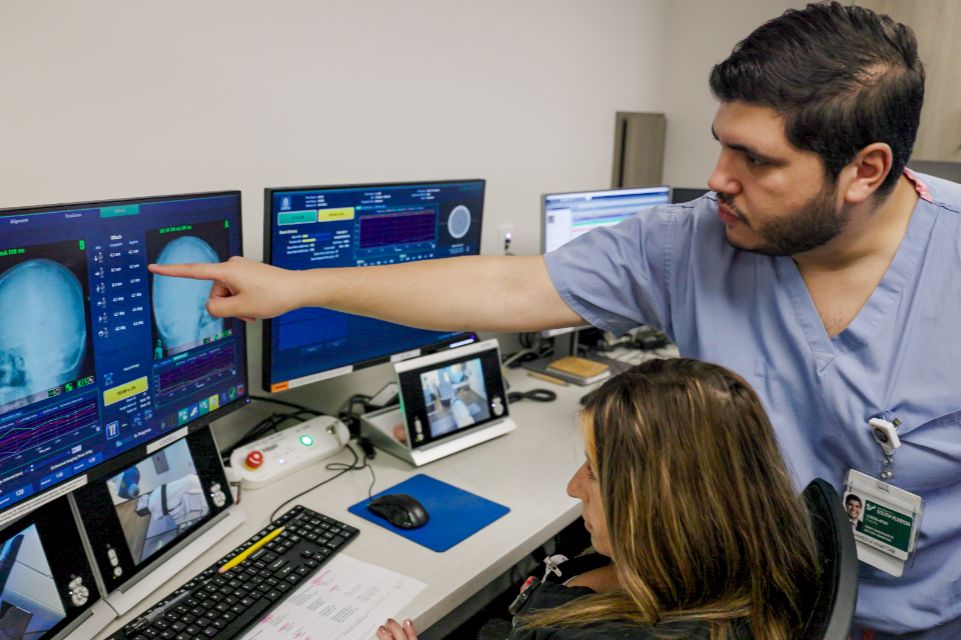Tampa General Hospital is First Health System in Tampa Area to Offer Minimally Invasive Procedure for Tremor
Published: Aug 19, 2025
Utilizing specialized radiosurgery technology, this procedure may improve outcomes for tremor patients compared with other available therapeutic interventions.
Tampa, FL (Aug. 19, 2025) – The Neuroscience Institute at Tampa General Hospital (TGH) now offers stereotactic radiosurgery (SRS) thalamotomy, a new and minimally invasive treatment for tremor, or uncontrollable shaking, in select patients with essential tremor (ET) and tremor dominant Parkinson’s disease (TD-PD). The integration of this revolutionary treatment option now allows for a full suite of services available for patients with movement disorders. TGH is the first health system in the West Central Florida region to offer SRS thalamotomy and one of the few in the nation utilizing a recently developed “frameless” technique that avoids traditional cranial fixation pins (head frame), maximizing patient comfort while providing precise treatment. The innovative and specialized technology delivers high-intensity radiation to a small, precise area in the brain that is responsible for tremor generation. The SRS procedure requires no anesthesia, incisions, drilling or head shaving and, because it is an outpatient procedure, patients can go home the same day.
Tremors in ET and TD-PD can affect almost any part of the body, but most commonly occur in the hands, and can happen at any age, but are usually seen in people 40 and older. While the condition isn’t life-threatening, it can be disabling and worsen over time. If tremors become severe, the condition may cause difficulty in performing everyday tasks, such as eating, drinking, writing, shaving, putting on makeup or even speaking.
“This procedure has the potential to improve the lives of many in our region, as tremors are the most common movement disorder, and SRS has been shown to be safe and effective in providing good tremor control and can improve quality of life in patients for whom medications did not work to control tremors,” said Dr. Mohamed Khattab, radiation oncologist, TGH Cancer Institute, and Assistant Professor, Radiation Oncology, and director of research, CNS Radiation Oncology, USF Health Morsani College of Medicine. “SRS can be particularly beneficial for patients with severe, medically refractory essential tremor and Parkinsonian tremor, meaning that their tremors do not typically see improvement with medications or other therapies.”
“With the addition of SRS to our existing world-class deep brain stimulation and focused ultrasound programs, TGH and USF Health are one of very few centers to offer patients the full suite of functional neurosurgery treatment options, allowing us to offer tailored, personalized treatment for patients for debilitating tremors,” said Dr. Yarema Bezchlibnyk, functional neurosurgeon at TGH and Associate Professor and Head of the Division of Stereotactic and Functional Neurosurgery, Department of Neurosurgery, Brain and Spine, USF Health Morsani College of Medicine. “We are proud to offer another innovative treatment for our patients that can significantly improve symptoms with minimal downtime.”
In addition to offering SRS, Tampa General also performs deep brain stimulation (DBS) and focused ultrasound as part of its suite of comprehensive services for movement disorders. DBS is the most common surgical approach to treating ET and TD-PD. It requires a hospital stay and involves incisions to implant hardware in the brain. The procedure offers very effective, reversible and modifiable therapy for tremors, but some health conditions may prevent patients from being a candidate for deep brain stimulation. Focused ultrasound is another option offered at TGH that is incisionless, with results seen immediately after the procedure. To qualify, patients are required to meet a specific skull density ratio and have their heads shaved.
“We are excited to bring this innovative option to our patients and provide them with the best possible options to improve their lives,” said Dr. Oliver Flouty, functional neurosurgeon at TGH and Assistant Professor, Department of Neurosurgery, Brain and Spine, USF Health Morsani College of Medicine. “For those who could not find relief through medication alone, or did not qualify or want to undergo deep brain stimulation or focused ultrasound, SRS can provide significant advantages in terms of safety, recovery time and effectiveness, giving patients a new path toward relief and improved quality of life.”
Learn more at: www.TGH.org/SRS
